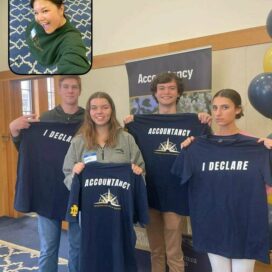Not just Wall Street: Finance alumni leverage their degree in a variety of careers
Published: January 20, 2022 / Author: Hailey Oppenlander
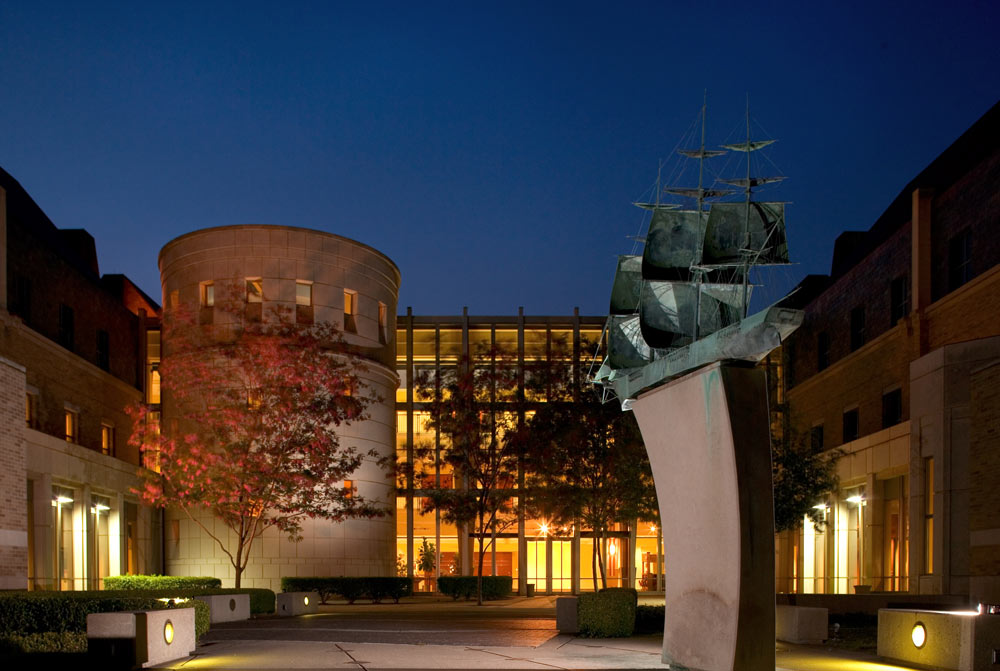
Though Wall Street is often regarded as a primary landing place for finance majors, the resources and opportunities at Notre Dame lead finance students to a variety of postgraduate destinations, from academia to Broadway.
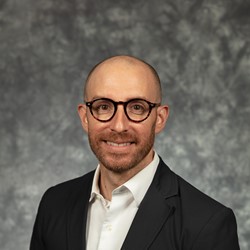
Jason Reed
As the assistant department chair and director of undergraduate studies for the Finance Department, Professor Jason Reed works closely with undergraduate finance majors. Reed often introduces them to the program and helps chart their path in the major.
Reed says that a growing number of students are showing interest in careers outside traditional investment banking jobs on Wall Street, jobs which can offer less grueling hours but allow employees to leverage many of the same skills.
“The students that I’ve talked to find that those alternatives to investment banking are incredibly rewarding,” says Reed.
No matter how far from Wall Street they venture, students in the finance major are prepared to use their education to find success in a variety of career paths.
“I think one of the things that we do with our finance curriculum is really equip students with tools that are wide-ranging,” Reed says. “We kind of pride ourselves on the fact that students are building out…some of those more qualitative skills alongside some of the more hard quantitative skills.”
Following Your Passions
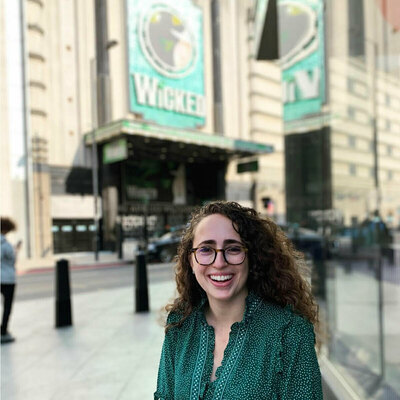
Sam Squeri ’17
For many students, underlying passions, rather than a high salary, inspire their work. Sam Squeri ’17 works as manager of production finance for Universal Theatrical Group, owned by NBC Universal. As a finance and film, television, and theatre double major, corporate finance for the theatre industry was the perfect blend of Squeri’s interests.
Squeri completed Comcast’s CORE (Career Opportunities & Rotational Experiences) Finance Rotational Program for two years after graduation and now works in operations. She works on finance for productions, including Wicked Broadway, Wicked U.S. Tour, and Wicked London, making decisions regarding marketing and sales in order to ensure that their revenue exceeds their costs.
Though this finance path is far from investment banking, Squeri notes that Professor Carl Ackerman encourages his students to find the area of finance that they feel connected to, wherever that may be. “He’s very much the one that encourages you to find the area that you’re most passionate about,” Squeri recalls.
Squeri cites Mendoza College of Business’ core curriculum as integral to understanding all aspects of business that intersect with her job duties. “Most of the people I interact with on a day-to-day are not finance people,” she says. “My job is finance for everyone else. So I am the expert in finance, but I’m working with creative teams [and] I’m working with health and safety teams because of COVID.”
Aside from the Mendoza coursework, Squeri was prepared for her postgraduate career from valuable experience through the Pasquerilla East Musical Company (PemCo), a student-run theatre group.
“The cool thing about PemCo is it is a company,” says Squeri. The group performs shows for the study body each semester, and students are in charge of everything from directing, creating a budget, buying the rights to shows, and projecting ticket sales. Since it’s all student-run, Squeri was able to witness and learn firsthand about how finance works in the theatre realm.
Gaining Hands-on Experience
Notre Dame finance students receive exposure to a variety of real-world opportunities both inside and outside the classroom. “Students, from right as they basically matriculate on the campus, have the ability to participate in student-led clubs that are partnering with a variety of different firms to actually solve real problems,” says Reed.
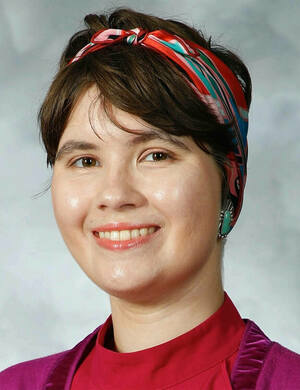
Tatiana Vdovina ’18
Tatiana Vdovina ’18 says that her involvement in finance-related student clubs transformed her educational experience at Notre Dame. “I would say what Notre Dame does best is kind of combining this academic knowledge with real life experience in a way that many other schools don’t do nearly as well,” she says.
The Student International Business Council allowed Vdovina to gain experience working in teams to solve problems for businesses. “You actually get to work with employees at the companies that kind of give you this case project, and you get to interact with them, at least on a weekly basis,” she explains. “That just kind of made me feel like I was much more involved in the corporate world.”
Vdovina was also a member of the research-based Investment Club and the Undergraduate Women in Business Association, which helped her to connect with and support other women in finance. “It was definitely refreshing to see a group on campus that embraces diversity and embraces the role of women in different professional situations,” she says.
In addition to these clubs, Vdovina gained experience conducting research with then-Professor Taehyun Kim doing statistical calculations for Kim’s work on mergers and acquisitions.
Through these hands-on experiences and her coursework, Vdovina grew to realize that she felt more drawn to research than operational work in finance. She is now pursuing a Ph.D. in finance at the Olin Business School at Washington University in St. Louis.
“What drove me to [a] Ph.D. program was really strong interest in research, and kind of wanting to solve some real life problems through an academic lens,” says Vdovina. “All of the research is ultimately informed by real life problems.”
Her current research is focused on household finance and macroeconomic finance, which has real implications, especially during the pandemic. From her research to her work as a teaching assistant, Vdovina’s interest in academia stems from the way that a Notre Dame education encourages its students to be a force for good in the world.
“For me, a choice to do a Ph.D. program was also informed by, well, I want to be a good teacher and be able to teach students not just those finance skills . . . but also prepare them for fulfilling jobs in whatever path they decide to choose,” Vdovina says.
Connecting with the Alumni Network
For students looking to carve a path in alternative careers for finance majors, the alumni network can open up valuable opportunities and connections.
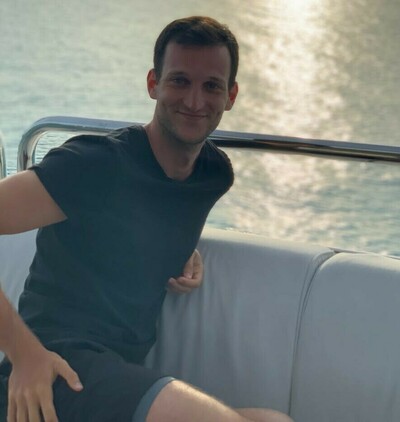
Evandro Nadal ’17
“They’re going to be able to be connected with Notre Dame alums all over the world in every facet of business,” says Reed. “The career center does a really good job of maintaining and cultivating that.”
Evandro Nadal ’17 says that his favorite part of his finance degree is the community of alumni and students. “You’re constantly meeting a big group of diverse, sharp, and scrappy alumni, and you can just have great conversations with them,” he says.
As an entrepreneur, making and building connections with others is integral to his work. Nadal also gained entrepreneurial skills by running a burger restaurant and delivery business out of Dillon Hall as an undergrad. After this experience, he and his co-partner decided that they wanted to make entrepreneurship their postgraduate career path as well.
Now, Nadal co-runs their business, a software development agency called K-Optional Software. Running his own business gives Nadal the perfect balance of creativity and practicality. “I wanted something that had more impact and had more accountability in my work,” he says.
Nadal has found his finance coursework to be relevant even in blazing his own path. Corporate Finance II and Process Analytics taught Nadal how to make business-savvy decisions and determine which ideas are worth pursuing. “You can think of everything in terms of being a process, and if you can hash the process to be the most effective, that’s the way you scale a business,” he says.
In addition, assistance from the IDEA (Innovation, De-Risking and Enterprise Acceleration) Center helped turn Nadal’s entrepreneurial dreams into a reality. “Notre Dame provided a lot of resources to help us out,” says Nadal. The IDEA Center’s pre-accelerator programs offered opportunities for guidance, mentorship, and workshopping for budding student business owners.
These resources available to finance majors ensure that they’ll be prepared for any endeavor they pursue after graduation. “The tools that we develop here, I absolutely believe allow students to succeed,” says Reed.



